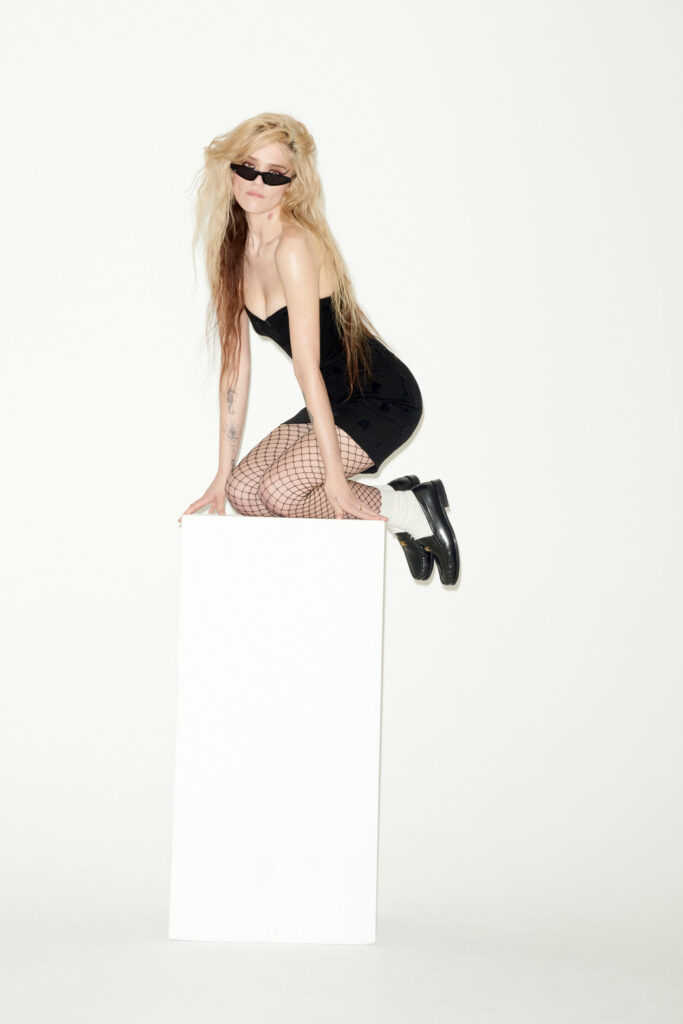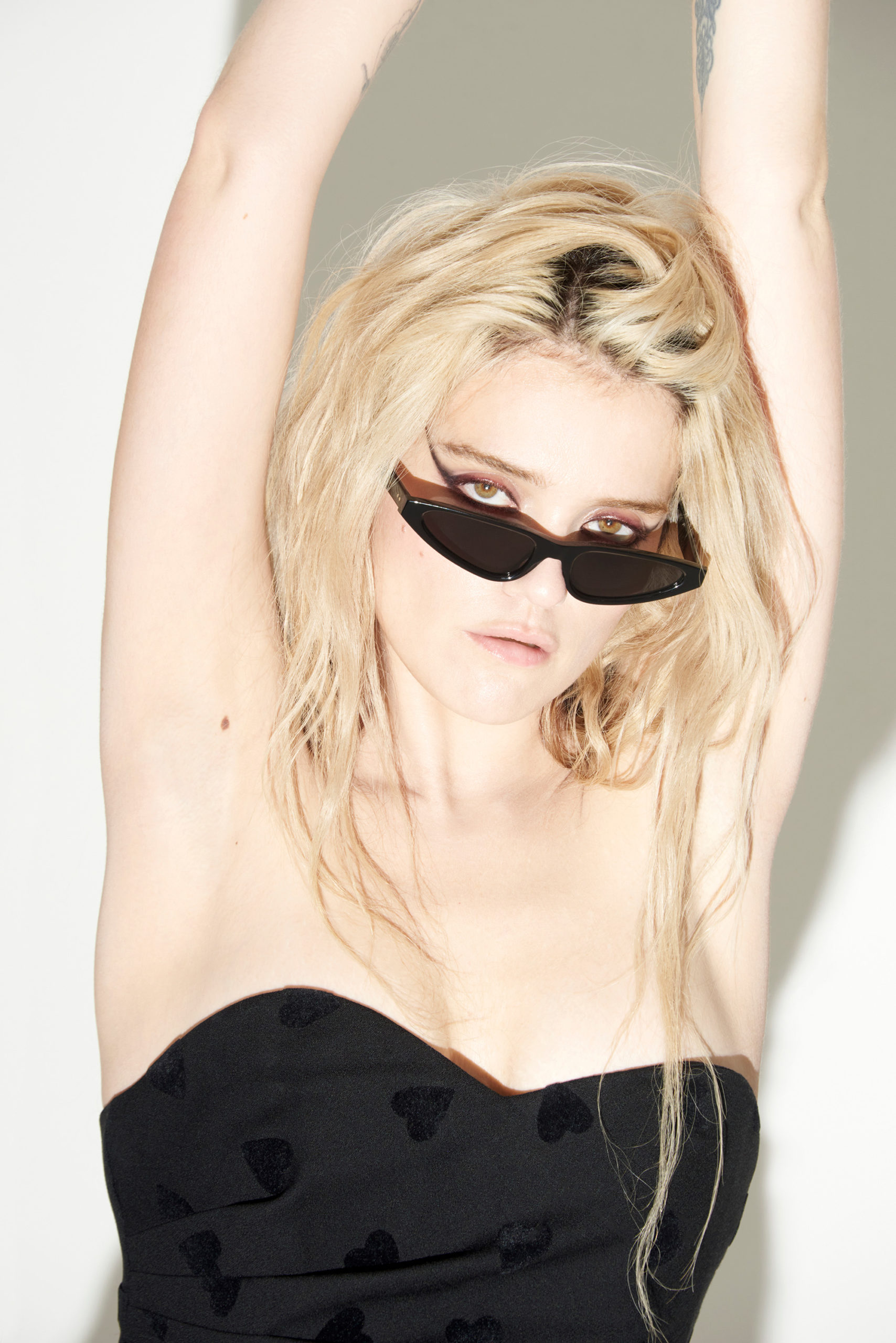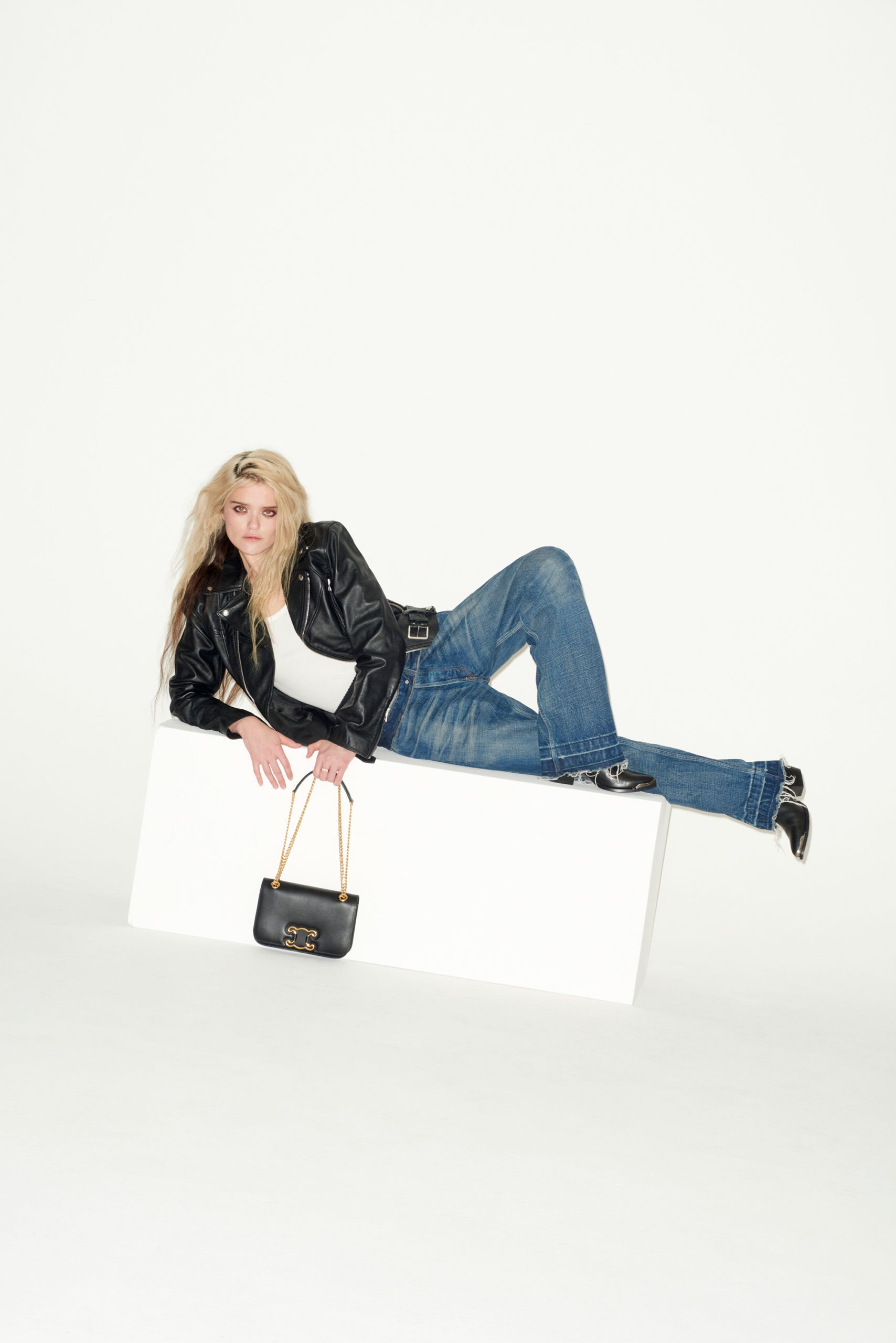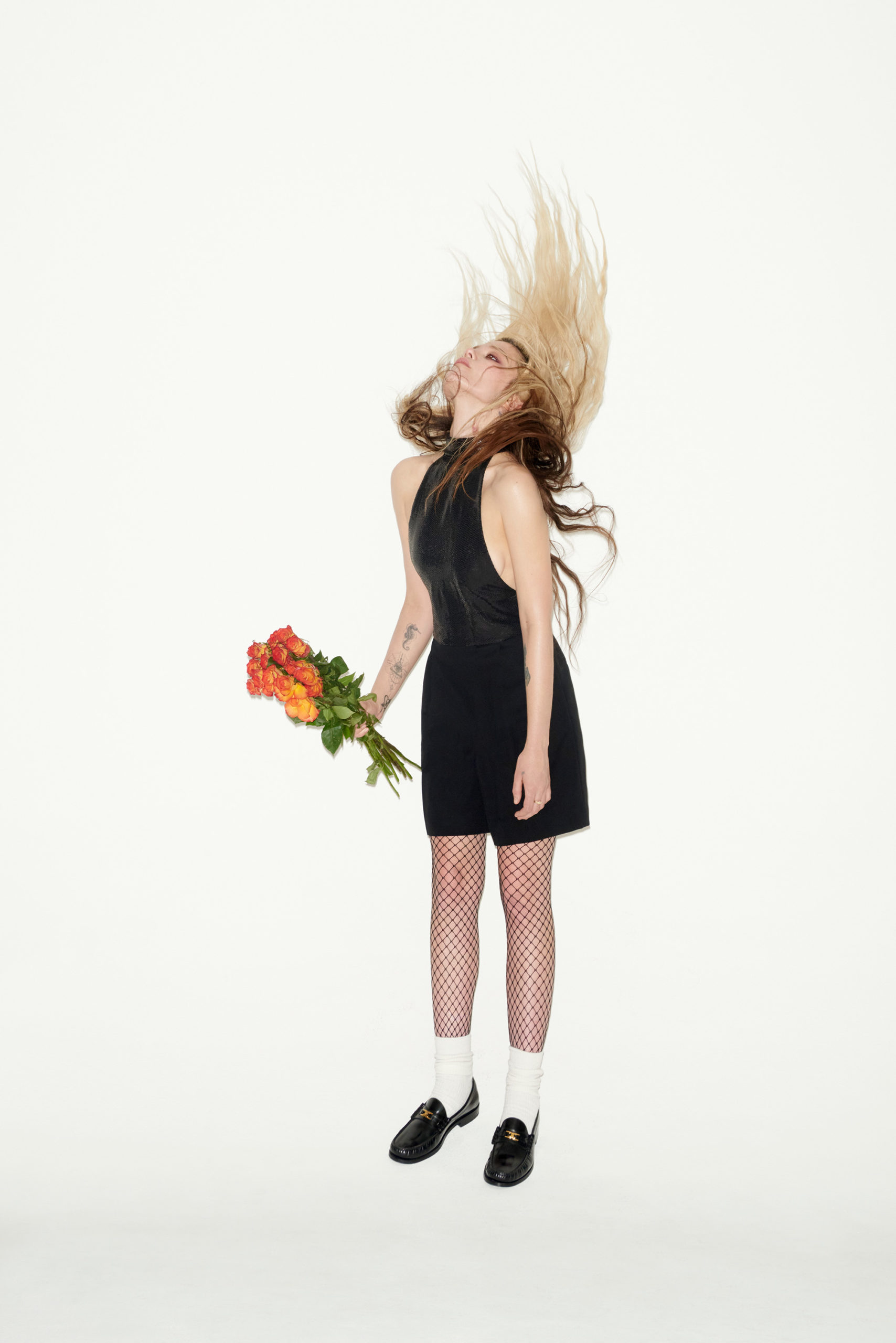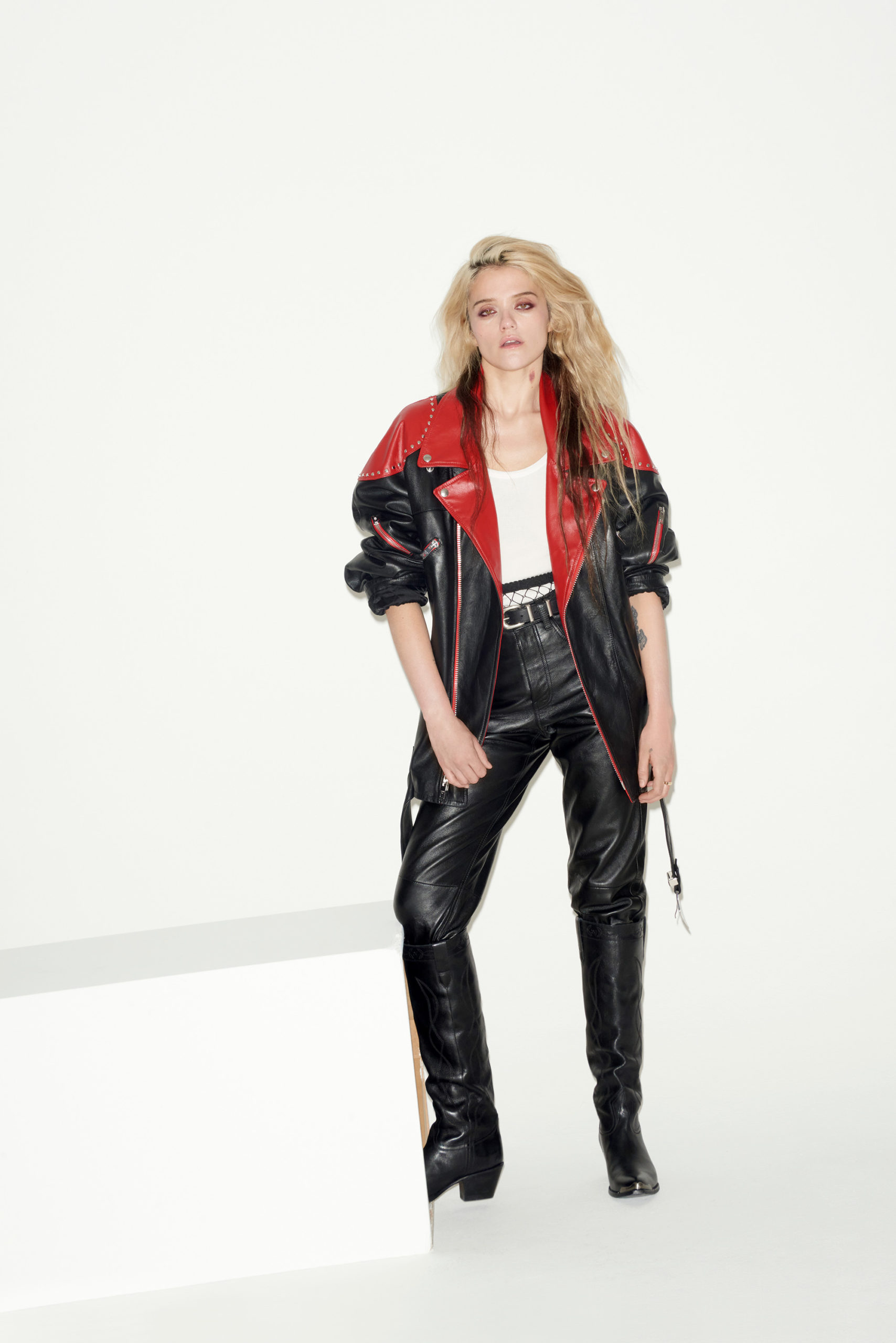Sky Ferreira is back. She’ll tell you, however, that she never left. After releasing her stunning debut album, Night Time, My Time, in 2013, she quickly announced her follow-up, Masochism. “If it doesn’t hurt, then it’s not real,” she said back then, by way of explaining the title. It turned out to be a self-fulfilling prophecy. Years of label drama kept Ferreira down, but not out. After a painful period where she was free to make music but unable to release it, Masochism will finally appear this year. In anticipation, Ferreira chatted with her own pop icon—who’s fought and won some battles herself—the legendary Nancy Sinatra.—BRUCE BENDERSON
———
SKY FERREIRA: Hi, this is Sky. Can you hear me?
NANCY SINATRA: Hi Sky. It’s so good to meet you, sweetheart. Really.
FERREIRA: It’s nice to meet you.
SINATRA: I saw your really sweet post on Instagram about my album Nancy. It’s very flattering. Thank you.
FERREIRA: I’m such a big fan. I’m not going to lie, I’m a little nervous, and I don’t usually get like that.
SINATRA: You know what’s interesting? There are 50 years between us, but there’s no generation gap.
FERREIRA: Yeah, totally. I was thinking about that earlier. Your work and your image, everything about you, there’s always something very modern about it. I think you’ve had a very big influence on women in pop music, there’s something very timeless about you.
SINATRA: Thank you so much. I’m curious, really because of my family, did your family play a part in your choice of a career?
FERREIRA: No one in my family is really involved. I’m the only one that does anything musical. They’re creative people, though. My grandmother is a hairdresser, she worked with a lot of musicians when I was a kid, so I guess I was sort of around it. But no, I think they wanted me to be more conventional or something—
SINATRA: An accountant?
FERREIRA: And it just wasn’t in the cards for me.
SINATRA: [Laughs]
FERREIRA: I mean, I’m counting with my fingers still, so that was never going to happen. What about you? Were you always planning on doing it or did it just sort of happen over time?
SINATRA: Well, it was all I knew. I studied piano for 12 years, classical music, and I just didn’t know anything else. It was by osmosis, I think.
FERREIRA: Yeah.
SINATRA: But you’re a trailblazer. You started the whole thing in your family. I think that’s wonderful. And your style is so amazing. There seem to be a lot of influences. I don’t want to typecast you, but I see Madonna, and Debbie [Harry], and the Ramones, and it feels like some of your songs could have been in a John Hughes movie.
FERREIRA: Thank you.
SINATRA: Were you ever asked to be involved in a James Bond film?
FERREIRA: No, but—
SINATRA: You should be writing a song for a Bond movie and performing it. Plus you could probably be in it too, with your image. Oh, speaking of, how important is image, makeup, and hair?
FERREIRA: For me, it’s always been important because it’s an artistic thing, it’s a form of expression. I think a lot of people assume that it has something to do with vanity.
SINATRA: Yeah.
FERREIRA: But what I was going to say earlier is that you were such a big influence on me, growing up. I remember I got a record player when I was 11 years old, and I bought three albums, and one of them was yours. And I used to watch videos of you. This is when YouTube was brand new. Also your voice had such a big influence on me, singing-wise.
SINATRA: Well, thank you. I love your version of “Bang Bang.” That cello is so gorgeous. It’s my favorite instrument anyway, the cello.
FERREIRA: Me too. It was funny, because it was one take. And it was with 2CELLOS, because I had the same manager as them at the time. I was probably 19 or 18 when I did it.
SINATRA: I love it. You know that you have a wisdom. It shows through in your cover choices. You seem to have been here before.
FERREIRA: Yeah.
SINATRA: Do you know what that is?
FERREIRA: I think so. What does it mean to you, exactly?
SINATRA: Well, just that you’ve lived before somehow.
FERREIRA: I get what you’re saying, and I think so, too. I feel like music just came naturally to me, and it was my purpose in a way. It kept me out of—it just helped me navigate things, and I’m lucky to have that. But I’ve always felt like an old soul. I’ve always had that feeling.
SINATRA: That’s right. Exactly. An old soul.
FERREIRA: Yeah.
SINATRA: I did some research and you’ve spoken of not being allowed to do what you wanted to do, and feeling trapped. Who and what trapped you and stopped you?
FERREIRA: There’s quite a few things that did it, but I feel like I was misunderstood. In the music industry, everyone’s trying to mold you. They have an idea of what you should be. People get greedy. When I was younger, I got cornered in situations where it was like, “You have to do this,” and I didn’t know better. It was just different back then. The internet was there, but it wasn’t this thing that people had figured out. I used it to my advantage—that really helped me get my stuff out. But I’ve been shelved so many times. You know, I first came out when I was 15 and it wasn’t a fair representation of me. And then, I wasn’t even that much older, but I started meeting people to collaborate with, and it started falling into place.
SINATRA: Well, that’s good.
FERREIRA: Didn’t you kind of have a similar thing?
SINATRA: Sort of.
FERREIRA: Not exactly the same, but—
SINATRA: Yeah, I was pigeonholed early on into this bubble gum image, and I had to fight my way out.
FERREIRA: They always want to do that, don’t they? They love the bubble gum thing. That was exactly what happened to me the first time. I got around it and they didn’t like that too much. [Laughs]
SINATRA: Well, women with power are sometimes not very welcome.
FERREIRA: Yeah.
SINATRA: So your album, Masochism. Why did it take so long, because it was announced in 2015, wasn’t it?
FERREIRA: Yeah, it was a lot of what I was saying before. My record label, it’s like musical chairs. One person might run the label, then another—they just switch seats. I wanted to try to have a better relationship with them originally. I wasn’t going to compromise, but I was willing to be a little more open, because I didn’t want to have a bad relationship with them. I wanted them to do stuff with me and give me a fair chance.
SINATRA: And help you.
FERREIRA: Yeah. Because a lot of it I paid for myself when I modeled and stuff. I was lucky I had that for a really long time, but they didn’t like that I got around them, and it didn’t make them look very good, to have a 21-year-old beat you at your own game publicly.
SINATRA: Yeah. A 21-year-old woman on top of everything.
FERREIRA: Exactly. I wasn’t afraid of them. You’re set up in situations to seem difficult, but also, what does that even mean? Just that you’re not willing to be completely controlled. And it’s funny how these people think. It’s as if you’re ungrateful, as if you’re not working for it. They’re like, “Don’t you know how lucky you are? There’s another one of you in line.” And I’m like, “Okay, well go do it with them then.”
SINATRA: Yeah. Prove it.
FERREIRA: You could put the person with all the same people I’ve worked with, and you could dress them the same, but at the end of the day, I’m not manufactured, so it’s never going to be the same result. It’s a respect thing. A lot of it is sexist, but I also think it’s because I started when I was 14, so they feel like they can manipulate me, or treat me like a 14-year-old or something. I’m 30 years old now and it’s the same thing.
SINATRA: Yeah.
FERREIRA: So they’ve just been dragging it out for years at this point, and it’s like pulling teeth, but I’m almost there.
SINATRA: Just keep reaching for the stars, and well, you’re already there, I think.
FERREIRA: Thank you.
SINATRA: How much music have you written that doesn’t appear on an album yet? A lot? Do you write all the time?
FERREIRA: I wouldn’t say all of them are very good, but I’ve written a lot of songs over time. The ones that stay for a while, I almost have to distance myself, because when you’ve heard it a thousand times it sounds old, or you’re not really sure how you feel about it. The only sure thing about all of this is that I can take a month or two without listening to a song and have fresh ears, and also a better perspective on what I want to say.
SINATRA: Right.
FERREIRA: Did you reissue your albums recently?
SINATRA: Yeah, there’s a retrospective Nancy & Lee collection that’s coming out on Light in the Attic Records. It’s pretty cool. I appreciate what they do. But I was curious, to go back to this other subject. if you identify as a masochist personally, or do you think about it in broader terms? Do you beat yourself up?
FERREIRA: Yes.
SINATRA: I was afraid of that.
FERREIRA: That’s kind of what it’s about, trying to learn how to undo those things. It’s easier said than done, even when you’re telling yourself you’re not really like that anymore. But yeah, I’m very critical of myself, and I fixate on things. I’ll be in situations where it’s not hurting anyone else but me, and I’m trying to unlearn those habits.
SINATRA: You’re still getting to know yourself. You’ve got time. Don’t be too tough on yourself, okay?
FERREIRA: Thank you.
SINATRA: You really shouldn’t. My dad always said, “All I owe the public is a good performance.” And I get the feeling you agree with that. Do you?
FERREIRA: Yes. One hundred percent.
SINATRA: I had a feeling that was true. My dad was very wise, too.
FERREIRA: Did he influence you a lot?
SINATRA: He gave me some good advice. He said, “Stay away from what I do.” So I did. I went in a different direction. But you are your own person. You have a specific personality, and you seem to have a specific direction for your life and your music, and I admire that so much. I didn’t have that when I was your age.
FERREIRA: That means a lot to me.
SINATRA: Well, I hope we’ll be friends forever.
FERREIRA: I hope so, too.
SINATRA: What do you see in your future, or do you think that far ahead? Do you see a family, or romance, or a relationship?
FERREIRA: I hope so, but not just for the sake of doing it. It would have to be someone that gets me and supports me as a person, as an artist, and isn’t trying to dim my—I don’t mean light as in spotlight or something—I just mean, like, the fire in me. And I feel like that’s easier said than done.
SINATRA: That’s a great attitude. I do wish for you a family of your own, because I think you would be such a great mom.
FERREIRA: Thank you.
SINATRA: I really do.
FERREIRA: I’m not opposed to the idea. I just don’t see it right now, in this period of my life, but at some point.
SINATRA: Do people ask you the same questions over and over again? I’m sorry if I’m repeating them.
FERREIRA: No, you’re not, not at all, actually.
SINATRA: Your last album, where did you record it and was the location important?
FERREIRA: I recorded it in Los Angeles. I was living in New York for a long time, but I had come to L.A. all the time for work and stuff. But I lived all over. I started making and recording music in Sweden when I was a teenager. But I always wanted to go to New York. I moved there when I was 16, which is crazy. I was pretty headstrong. No one was going to tell me no. It didn’t go down too well with my family, but there was no talking me out of it. And now I live in Los Angeles. I never thought I would come back here, but I love California, and I love L.A. At the same time, socially, there’s a disconnect. I remember the liveliness in New York. I really found myself there in my late teens and my early 20s. But in New York, it’s hard to find recording studios, at least where you’re not having to pay a ton of money, so I was working in L.A. a lot. I guess it influenced me at the time, because it would bring a lot of stuff out of me, a lot of things that I avoided.
SINATRA: When you did the cover of “Easy,” which I love, did you choose that yourself or did somebody pick it for you?
FERREIRA: I was actually in the movie called Baby Driver, and the cover was written into the script. But there was no direction for it. I was like, I shouldn’t sound exactly like Lionel Richie because that doesn’t make sense for me. Before I recorded it I would talk about it with the director, Edgar Wright. He has a very musical ear. The lyrics are quite sad, and I never realized that growing up. It was sort of, “How do we express that and also express the backstory without being so literal.” Cat Power was a big influence on it. She’s recorded a lot of covers and they’re all beautiful.
SINATRA: It’s great. I can’t tell you how much I love it.
FERREIRA: Thank you.
SINATRA: You know, I only met Elton John very briefly, just once. Is he as wonderful as he seems to be?
FERREIRA: Oh yes, definitely. I haven’t seen him in a long time, but he really helped me out in a lot of ways. I was a bit feral, I guess is a way to describe it, as a teenager, and I worked with him a lot. I remember, I went to this event with him and he bought me this dress. I didn’t go to prom so it was almost like the equivalent of that, but times a thousand. There was definitely a fairy godmother vibe when I was working with him.
SINATRA: Oh, that’s so nice.
FERREIRA: He’s a very nurturing person. And he’s funny too.
SINATRA: It’s been so nice to talk with you.
FERREIRA: Yes. Thank you.
SINATRA: Is Sky a nickname?
FERREIRA: No. It’s my actual name. It’s not short for anything.
SINATRA: It’s a beautiful name.
FERREIRA: Thank you.
SINATRA: All right sweetheart. Thank you for your time, and you take good care of yourself.
FERREIRA: You too. Thank you so much for doing this.
SINATRA: You’re welcome. Keep up the good work, okay?
———
Hair: Franziska Presche using Oribe at The Together Company
Makeup: Crystabel Riley using Tata Harper at Julian Watson Agency
Photography Assistant: Stefano Della Salda
Fashion Assistant: Apolline Coque

